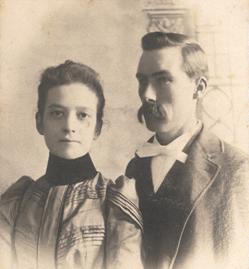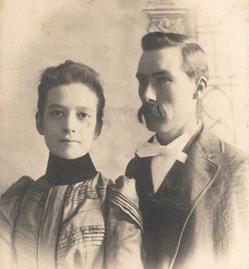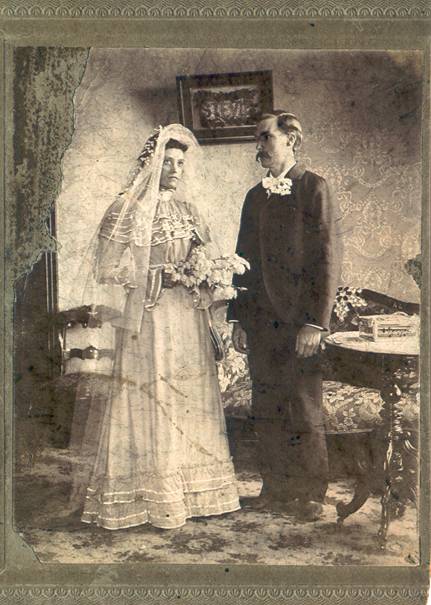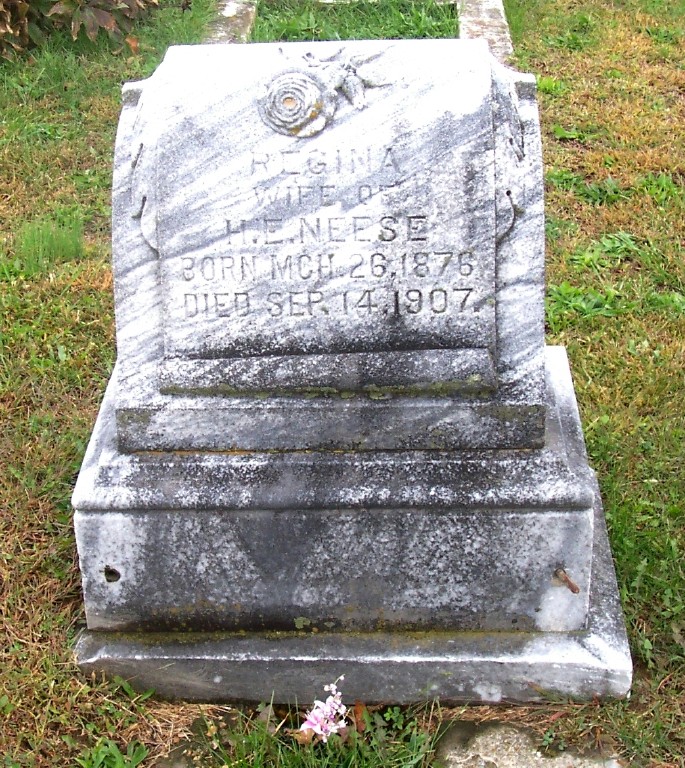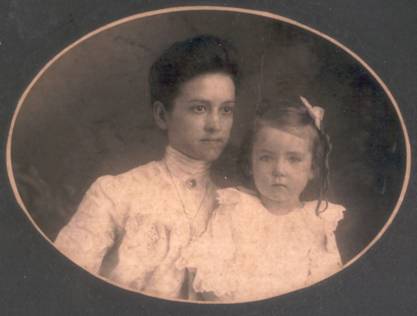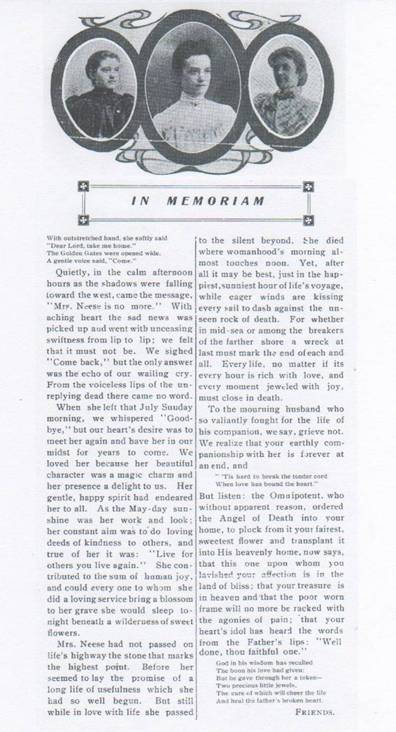Mrs. Neese's musical talent was inherit in her daughter. Even as a child, Rey, was encouraged by her mother to sing and play the piano. According to Rey, her mother would place Rey atop the piano and together they would sing with Regina accompanying. At her mother's funeral service in 1907, the barely six year old Rey sang the song "Does This Railroad Lead to Heaven?"
Not only adored by her family, Mrs. Neese was beloved by the community of Bland. A memorial to her, photo to lower right, appeared in the 1907 "Bland Courier," after her death:
"In Memoriam"
With outstretched hand, she softly said
"Dear Lord, take me home."
The Golden Gates, were opened wide.
A gentle voice said, "Come."
Quietly, in the calm afternoon
hours as the shadows were falling
toward the west, came the message,
"Mrs. Neese is no more." With I
aching heart the sad news was
picked up and went with unceasing
swiftness from lip to lip; we felt
that it must not be. We sighed,
"Come back," but the only answer
was the echo of our wailing cry.
From the voiceless lips of the un-
replying dead there came no word.
When she left that July Sunday
morning, we whispered "Good-
bye," but our heart's desire was to.
meet her again and have her in our
midst for years to come. We
loved her because her beautiful
character was a magic charm and
her presence a delight to us. Her
gentle, happy spirit had endeared
her to all. As the May-day sun- .
shine was her work and look;
her constant aim was to do loving
deeds of kindness to others, and
true of her it was: "Live for
others you live again." She con -
tributed to the sum of human joy,
and could everyone to whom she
did a loving service bring a blossom
to her grave she would sleep to-
night beneath a wilderness of sweet
flowers.
Mrs. Neese had not passed on
life's highway the stone that marks
the highest point. Before her
seemed to lay the promise of a
long life of usefulness which she
had so well begun. But still
while in love with life she passed
to the silent beyond. She died
where womanhood's morning al-
most touches noon. Yet, after
all it may be best, just in the hap -
piest, sunniest hour of life's voyage,
while eager winds are kissing
every sail to dash against the un -
seen rock of death. For whether
in mid-sea or among the breakers
of the farther shore a wreck at
last must mark the end of each and
all. Every life, no matter if its
every hour is rich with love, and
every moment jeweled with joy,
must close in death.
To the mourning husband who
so valiantly fought for the life of
his companion, we say, grieve not.
We realize that your earthly com-
panionship with her is forever at
an end, and
"Tis hard to break the tender cord
When love has bound the heart."
But listen: the Omnipotent, who
without apparent reason, ordered
the Angel of Death into your
home, to pluck from it your fairest,
sweetest flower and transplant it
into His heavenly home, now says,
that this one upon whom you
lavished your affection is in the
land of bliss; that your treasure is
in heaven and that the poor worn
frame will no more be racked with
the agonies of pain; that your
heart's idol has heard the words
from the Father's lips: "Well
done, thou faithful one."
God in his wisdom has recalled
The boon his love had given;
But he gave through her a token-
Two precious little jewels,
The care of which will cheer the life
And heal the father's broken heart.
FRIENDS.
Mrs. Neese's musical talent was inherit in her daughter. Even as a child, Rey, was encouraged by her mother to sing and play the piano. According to Rey, her mother would place Rey atop the piano and together they would sing with Regina accompanying. At her mother's funeral service in 1907, the barely six year old Rey sang the song "Does This Railroad Lead to Heaven?"
Not only adored by her family, Mrs. Neese was beloved by the community of Bland. A memorial to her, photo to lower right, appeared in the 1907 "Bland Courier," after her death:
"In Memoriam"
With outstretched hand, she softly said
"Dear Lord, take me home."
The Golden Gates, were opened wide.
A gentle voice said, "Come."
Quietly, in the calm afternoon
hours as the shadows were falling
toward the west, came the message,
"Mrs. Neese is no more." With I
aching heart the sad news was
picked up and went with unceasing
swiftness from lip to lip; we felt
that it must not be. We sighed,
"Come back," but the only answer
was the echo of our wailing cry.
From the voiceless lips of the un-
replying dead there came no word.
When she left that July Sunday
morning, we whispered "Good-
bye," but our heart's desire was to.
meet her again and have her in our
midst for years to come. We
loved her because her beautiful
character was a magic charm and
her presence a delight to us. Her
gentle, happy spirit had endeared
her to all. As the May-day sun- .
shine was her work and look;
her constant aim was to do loving
deeds of kindness to others, and
true of her it was: "Live for
others you live again." She con -
tributed to the sum of human joy,
and could everyone to whom she
did a loving service bring a blossom
to her grave she would sleep to-
night beneath a wilderness of sweet
flowers.
Mrs. Neese had not passed on
life's highway the stone that marks
the highest point. Before her
seemed to lay the promise of a
long life of usefulness which she
had so well begun. But still
while in love with life she passed
to the silent beyond. She died
where womanhood's morning al-
most touches noon. Yet, after
all it may be best, just in the hap -
piest, sunniest hour of life's voyage,
while eager winds are kissing
every sail to dash against the un -
seen rock of death. For whether
in mid-sea or among the breakers
of the farther shore a wreck at
last must mark the end of each and
all. Every life, no matter if its
every hour is rich with love, and
every moment jeweled with joy,
must close in death.
To the mourning husband who
so valiantly fought for the life of
his companion, we say, grieve not.
We realize that your earthly com-
panionship with her is forever at
an end, and
"Tis hard to break the tender cord
When love has bound the heart."
But listen: the Omnipotent, who
without apparent reason, ordered
the Angel of Death into your
home, to pluck from it your fairest,
sweetest flower and transplant it
into His heavenly home, now says,
that this one upon whom you
lavished your affection is in the
land of bliss; that your treasure is
in heaven and that the poor worn
frame will no more be racked with
the agonies of pain; that your
heart's idol has heard the words
from the Father's lips: "Well
done, thou faithful one."
God in his wisdom has recalled
The boon his love had given;
But he gave through her a token-
Two precious little jewels,
The care of which will cheer the life
And heal the father's broken heart.
FRIENDS.
Inscription
REGINA
WIFE OF
H.E. NEESE
BORN MCH. 26, 1876
DIED SEP. 14, 1907
